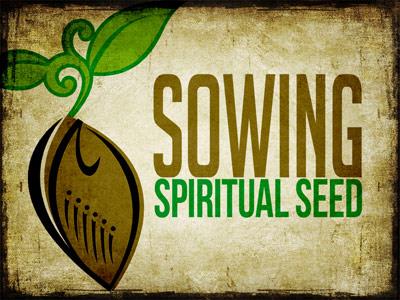-
The Parable Of The Sower And Seed (Luke’s Edition) Series
Contributed by Jonathan Spurlock on Nov 28, 2025 (message contributor)
Summary: The Lord Jesus Christ used this parable of the sower and seed to explain various reactions to the Gospel. The reactions of His day are much the same as in these days.
The Parable of the Sower and Seed (Luke’s edition)
Introduction: This parable of the sower and seed is recorded in each of the so-called synoptic Gospels (Matthew, Mark, and Luke). The Lord Jesus Christ used parables or stories like these to give people something to think about.
Farming and fishing were about the only ways people could find food in those days so it makes sense the Lord would use a feature of life as a figure of speech. Best of all, this is one of the parables which He not only gives, He also explains, and makes it easy for us to understand!
1 The parable delivered
Text: Luke 8:4-8, KJV: 4 And when much people were gathered together, and were come to him out of every city, he spake by a parable: 5 A sower went out to sow his seed: and as he sowed, some fell by the way side; and it was trodden down, and the fowls of the air devoured it. 6 And some fell upon a rock; and as soon as it was sprung up, it withered away, because it lacked moisture. 7 And some fell among thorns; and the thorns sprang up with it, and choked it. 8 And other fell on good ground, and sprang up, and bare fruit an hundredfold. And when he had said these things, he cried, He that hath ears to hear, let him hear.
This chapter begins after the Lord had shared a meal with Simon, a Pharisee (7:36-50). While there, an unnamed woman, a “sinner (usually interpreted to mean an immoral woman)” had anointed the Lord’s feet with ointment, then washed His feet with her tears and wiped His feet with her hair. The Pharisee seemed to be upset, if not appalled by these actions, and wondered in his heart if, as we might say, “Does He know who she is? Why is she doing this, and why does He allow it?”
Jesus replied to this with the parable of the “Two Debtors”. As Jesus explained, two men had debts: one, owing nearly two years’ worth of wages; the other, only about six weeks. Neither could pay off the debt so the lender forgave the debts of both. Jesus asked Simon who would love the former lender the most; Simon (grudgingly?) admitted it would likely be the one who had been forgiven the most. Jesus went on to show that the woman had proved her love by her deeds; Simon had almost insulted his Guest by not showing three common courtesies which were practiced in those days.
Now, after this, the Lord is going here and there preaching the Gospel (8:1-3). Besides the Twelve Disciples, who followed Him, a number of women ministered to Him but the text doesn’t clearly state these women actually followed Him. Regardless, some of these women (Mary Magdalene, for one) were sometimes more faithful than the disciples (John 20, e.g.),
And it’s at a certain time and a certain place, which Luke does not mention, that a group of people had come to hear what Jesus had to say. There were times when the Lord spoke plainly, giving no doubt what He was saying, but this was another time when He used a parable. He started some of the parables by saying, “There was a certain man, who did something. . .” and continue. Here He used a figure likely well known to those listening, namely, farming. Matthew (13:1-9) and Mark (4:1-9) mention Jesus was near the sea (of Galilee) when He spoke this parable. Luke doesn’t give the location but that’s not important. What was important is that people had come to hear Jesus—and they weren’t going to be disappointed!
Then Jesus began to deliver the parable. “A sower went out to sow his seed . . .” and I’m sure that spoke directly to the hearts of those hearing Him. Now, it’s true that Isaiah and Micah had both prophesied that the Israelites would, one day, beat their swords into plowshares and their spears into pruning hooks, but that day hadn’t happened in the days of Jesus and they won’t happen for a long time to come. I’ve read in a number of sources that the fields weren’t actually plowed, as we think of them, at all (like, deep-thrusting plows made by various farm equipment makers). The sower might take a stick and scratch a small hole in the dirt, drop in the seed, cover the hole with the (original?) dirt then move on. One man could literally sow a lot of seed in just one or two days, apparently.
And Jesus continued. He mentioned some “fell” by the wayside. Again, the seed landing or falling by the wayside could be because the sower himself was careless, or some of the seed had slipped out of his hand, or the wind might have blown the seed away from the field and onto the path or wayside. Even worse, the seed which fell by the wayside was “trodden down”—nobody either cared or noticed about good seed found in a bad location! Seed won’t grow on a sidewalk! Some problems like this one haven’t seemed to change very much, have they!?

 Sermon Central
Sermon Central



